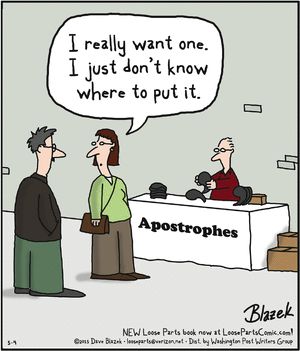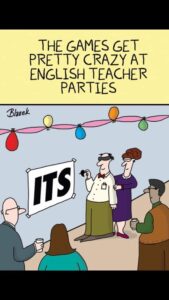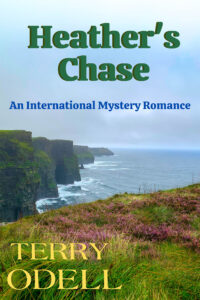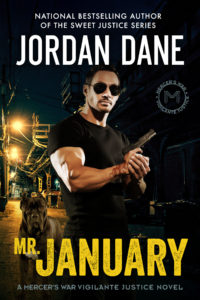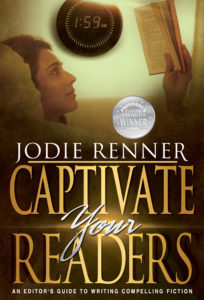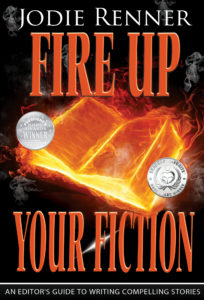Jordan Dane
@JordanDane

For your reading pleasure, we have an anonymous submission of 400 words. Please help with your constructive criticism by commenting. My feedback will follow. Enjoy.
***
Remnants of Sunday night trade at the Royal Derby Hotel were strewn in the gutter. Some poor bastard who didn’t get to enjoy the benefits of it would have to clean up the beer cans and broken glass. Jude stepped over vomit stains and around a bent up bicycle obstructing the footpath as it strained against the chain that kept it attached to a street pole. Cams message had been brief, “Murder in Brunswick Street, think your PI outfit could help. Meet me near corner of Cecil, 7am.” She hadn’t been able to reach him when she tried to return his call. That was an hour ago. She had left three messages for James already without any response. She willed him to come. Check your phone James. Please be on time. I need you here.
Two hundred metres further on the opposite side of the street Jude saw a gaping black hole in a shop front and stopped. Its window display had spilled across the footpath after a fire had blown out the glass. She felt a mild strangling feeling and shuddered. Fuck. Why does it have to be a fire crime, I hate fire crimes, Cam must remember that, he should have told me. Cam was standing outside the shop scratching his head and surveying the contents of the footpath. Beggars can’t be choosers she reminded herself, took a deep breath, checked for cars and stepped into the road. She was hungry to get back into some serious investigative work and wasn’t going to let a bit of queasiness get in the way.
Cam looked up and smiled warmly when he saw Jude and stepped forward to give her a peck on the cheek. “Great to see you. Thanks for coming on such short notice.”
Jude took a quick step back. What’s with the kissing, that’s a bit familiar, this is a crime scene meeting she thought as she nodded towards the shop, “Appreciate the call, what’s the story?”
Cam’s smile faded as he looked at the shop, “Fire brigade got a call around 11pm. Extinguished it by four this morning and secured the scene. Found a body at the back.” He gestured into the open black hole of the building. “Forensics are in there now, doesn’t look like an accident to me,” he nodded at the contents of the footpath and smirked, “it’s, a, uh, fetish shop.”
FEEDBACK
GROUNDING THE READER – From the start we have what feels like a cop investigating a crime scene, but the reader has names without knowing what the players do or even what city they are in. (I had to look up that the Royal Derby Hotel is in Australia.) It takes work to decipher who Cam and Jude and James are. Things aren’t clearer until the very end.
Are they police? Arson investigators? News reporters? From Cam’s message, we learn that there’s a PI involved and it took a reread to see this is Jude. I’ve made a quick stab at a rewrite, trying to stay true to the scene as written, but I hope you can see how the names and job titles clarifies the intro. I might’ve started this story a different way, but I am showing this rewrite to demonstrate how important it is to orient the reader into the scene with details.
REWRITE SUGGESTION
Private investigator Jude Hawthorne stared down at the unexpected text message she had received from Homicide Detective Cameron Hunter as she stood under a pale street lamp.
Murder in Brunswick Street, think your PI outfit could help.
Meet me near corner of Cecil, 7am.
I’m here, Detective Hunter. Where are you?
Remnants of Sunday night trade at the Royal Derby Hotel were strewn in the gutter, making it hard to distinguish the trash from the explosion caused by the fire. Jude stepped over vomit stains and around a bent up bicycle obstructing the footpath as it strained against the chain that kept it attached to a street pole. As she came upon the charred remains of the storefront and shattered glass, she cringed.
Why does it have to be a fire crime? I hate fire crimes. Cam must remember that. He should’ve told me.
Readers don’t get a description of what happened until the mention of the fire blowing out a window half way down, otherwise the intro sounds like the dregs of a drunken party or Mardi Gras. In the last paragraph, there’s a mention of a ‘crime scene’ and a fire brigade with a body inside, but readers need to be oriented into the scene much sooner. In my rewrite above, I added the two red letter lines to mention the crime scene.
START WITH A DISTURBANCE – In the rewrite above, I focused on the disturbance of Jude getting an unexpected text message. She’s a PI and it would not be normal for her to get called to a homicide.
KEEP FOCUS ON EMOTION – Jude obviously has an issue with fires, yet her fear is embedded in a longer paragraph and glossed over. Make that front at center. By sticking with her emotional state, the reader gets invested in her as a character. They want to root for her. (I slapped this rewrite together as an example and cherry-picked what resonated with me. I’m sure the author could do better.)
BEFORE – Two hundred metres further on the opposite side of the street Jude saw a gaping black hole in a shop front and stopped. Its window display had spilled across the footpath after a fire had blown out the glass. She felt a mild strangling feeling and shuddered. Fuck. Why does it have to be a fire crime, I hate fire crimes, Cam must remember that, he should have told me. Cam was standing outside the shop scratching his head and surveying the contents of the footpath. Beggars can’t be choosers she reminded herself, took a deep breath, checked for cars and stepped into the road. She was hungry to get back into some serious investigative work and wasn’t going to let a bit of queasiness get in the way.
AFTER – Jude shuddered and found it hard to breathe as she stared into the gaping hole of the shop front, pitted by fire. Its window display had spilled across the footpath after a fire had blown out the glass. Her own demons were never far from the surface. Detective Hunter should have known to warn her.
Jude took a deep breath and clenched her jaw as she checked for cars and stepped into the road. She needed serious investigative work, even if the case cost her sleep and brought back nightmares she thought she’d left behind.
CHARACTER NAMES – Why does the author only mention first names in this intro? I recommend giving authority to your investigators from the beginning. Give them a job title and what relation they are to each other, as I did in the rewrite above. It took me awhile to realize that Jude is the PI, but who are the other players? Who is James?
To avoid the gender issue using the name Cam, I would mention his full name of Cameron at the start and maybe only start using ‘Cam’ when other people call him by his nickname to establish that Cam is Cameron.
I would also question why a cop would call in a private investigator to an official crime scene, but I will leave that up to the author to establish. I’m sure there is a good reason and it sounds intriguing.
POINT OF VIEW – It took me a few readings to get oriented into the POV intended here. The first two lines were through the eyes of a character, I presumed. So when I saw the name Jude, I thought this is deep POV 3rd person, but then Cam steps into the spotlight and because that name is gender neutral, I thought Cam was a woman until I get to a couple of spots and realize he’s not.
Did anyone else have an issue with gender and whose POV is central? Giving titles and orienting the reader faster would help with this confusion.
PUNCTUATION – A well placed comma can make all the difference. Remember the old grammar joke – “Let’s eat Grandma.” versus “Let’s eat, Grandma.” That comma would mean a huge difference if you’re Grandma. I would recommend reading aloud as part of an edit process. When you get to a spot where your voice naturally pauses, that’s usually where a comma goes. Just ask Grandma. There is also missing question marks and run on sentences that should be broken apart to be clearer.
Here’s a couple of examples:
BEFORE – ‘Fuck. Why does it have to be a fire crime, I hate fire crimes, Cam must remember that, he should have told me.’
Break this apart for clarity and add punctuation. I also recommend internal DEEP POV be italicized (if mixed into 3rd person POV) and I suggest that DEEP POV not be embedded into a paragraph. If it stand out more, it will draw the reader’s eye to it as if it were dialogue. Readers naturally look for dialogue when they are reading. With weighty long paragraphs, as in this submission, the reader might skim or lose important dialogue if it’s buried.
AFTER – Why does it have to be a fire crime? I hate fire crimes. Cam must remember that. He should’ve told me.
Cams message had been brief,… (Cam’s message had been brief,…)
BEFORE – Jude took a quick step back. What’s with the kissing, that’s a bit familiar, this is a crime scene meeting she thought as she nodded towards the shop, “Appreciate the call, what’s the story?”
AFTER – Jude took a quick step back, stunned.
What’s with the kissing. That’s a bit familiar. This is a crime scene, she thought.
All business, Jude nodded towards the shop and said, “Appreciate the call, what’s the story?”
LAST PARAGRAPH – I would break out the dialogue lines to allow the reader to find them more easily. But I’m still not sure why a PI would need to be called in on an arson/murder investigation, especially if it’s a fetish shop. Riddle me that, Batman.
And why is he sure it wasn’t an accident simply because it’s a fetish shop? That’s the implication. His smirk is a little sophomoric, but maybe that is intentional. Is he a professional guy or a wise cracker? We don’t know yet.
BEFORE – Cam’s smile faded as he looked at the shop, “Fire brigade got a call around 11pm. Extinguished it by four this morning and secured the scene. Found a body at the back.” He gestured into the open black hole of the building. “Forensics are in there now, doesn’t look like an accident to me,” he nodded at the contents of the footpath and smirked, “it’s, a, uh, fetish shop.”
AFTER – Cam’s smile faded as he looked at the shop.
“Fire brigade got a call around eleven pm. After they extinguished the blaze by four this morning and secured the scene, they found a body at the back.”
He gestured into the charred chasm of the destroyed building.
“Forensics are in there now, but it doesn’t look like an accident to me.” He nodded at the contents of the footpath and smirked, “it’s, a, uh, fetish shop.”
FOR DISCUSSION
What feedback would you give this author, TKZers?
 As writers, we don’t read the same way “normal” people do. We have internal editors who insist on reading along with us and shouting their opinions.
As writers, we don’t read the same way “normal” people do. We have internal editors who insist on reading along with us and shouting their opinions.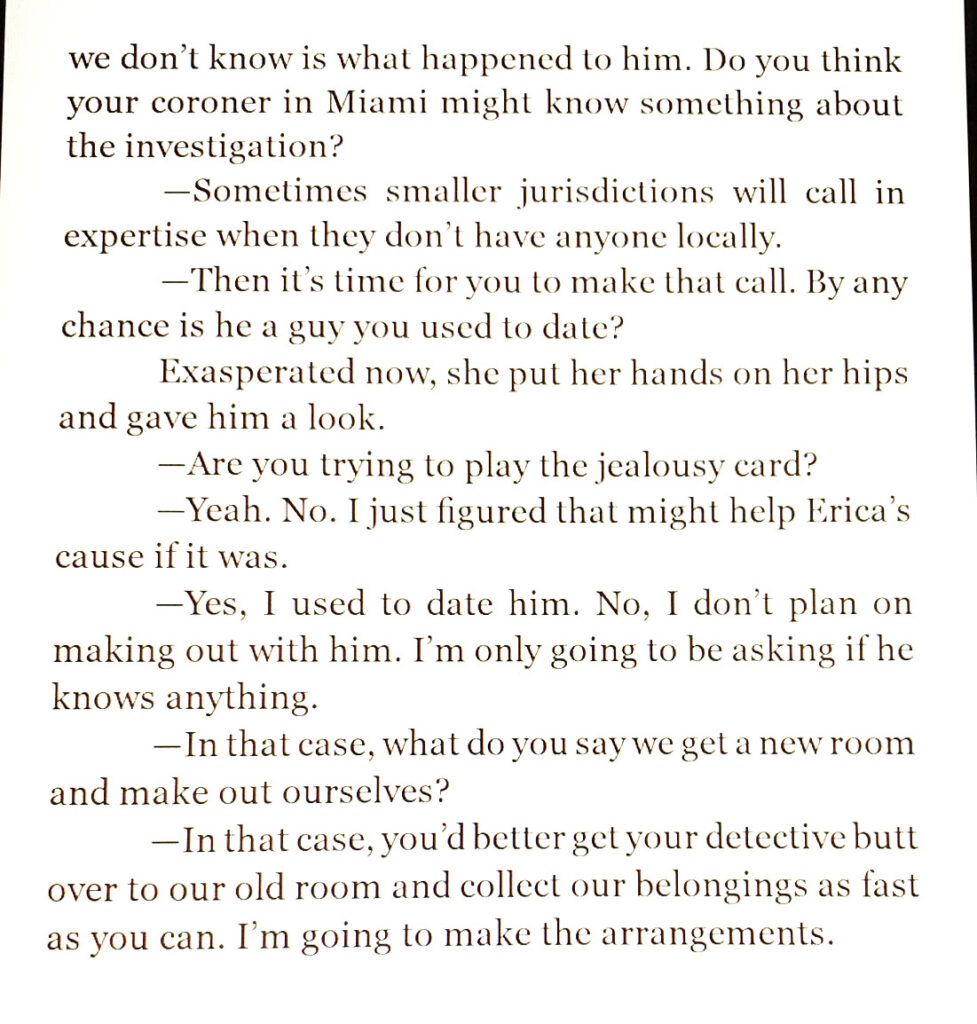 Now, maybe language is changing, and maybe the ‘rules’ we are taught are changing as well, but one “rule” I try to follow is:
Now, maybe language is changing, and maybe the ‘rules’ we are taught are changing as well, but one “rule” I try to follow is: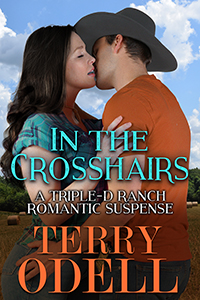 Available Now. In the Crosshairs, Book 4 in my Triple-D Romantic Suspense series.
Available Now. In the Crosshairs, Book 4 in my Triple-D Romantic Suspense series. Terry Odell is an award-winning author of Mystery and Romantic Suspense, although she prefers to think of them all as “Mysteries with Relationships.”
Terry Odell is an award-winning author of Mystery and Romantic Suspense, although she prefers to think of them all as “Mysteries with Relationships.”
